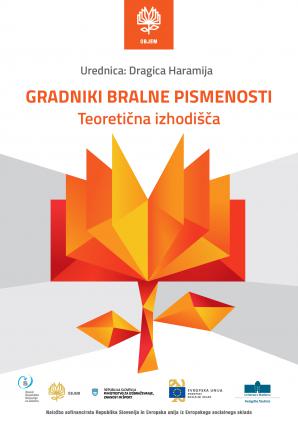Gradniki bralne pismenosti: Teoretična izhodišča
Keywords:
building blocks of reading literacy, literacy, Slovenian language, methods, interdisciplinary connectionsSynopsis
Components of Reading Literacy: Theoretical Starting Points. The academic monograph on the components of reading literacy includes eleven chapters that take an in-depth look at the basis for each individual block. Developing components of reading literacy is systematic as they are intended for all levels of education, from nursery school to secondary education, and at the same time their essential purpose is to direct the attention on the development of reading literacy into all areas of activities in nursey school and into all subjects in primary and secondary education. Each individual component of reading literacy develops as part of a w hole, a ll components are linked to the goals and objectives of all subjects/areas, and they develop procedurally. It is important that the components of reading literacy develop in an integrated way, in line with the abilities of children and students, depending on their development, prior knowledge, needs and particularities. Monograph includes nine components of reading literacy: speech, reading motivation, comprehending the concept of reading material, phonemic awareness, vocabulary, reading fluency, text understanding, response to the text and creating texts and critical reading. The academic monograph on the components of reading literacy includes eleven chapters that take an in-depth look at the basis for each individual block. Developing components of reading literacy is systematic as they are intended for all levels of education, from nursery school to secondary education, and at the same time their essential purpose is to direct the attention on the development of reading literacy into all areas of activities in nursey school and into all subjects in primary and secondary education. Each individual component of reading literacy develops as part of a w hole, a ll components are linked to the goals and objectives of all subjects/areas, and they develop procedurally. It is important that the components of reading literacy develop in an integrated way, in line with the abilities of children and students, depending on their development, prior knowledge, needs and particularities. Monograph includes nine components of reading literacy: speech, reading motivation, comprehending the concept of reading material, phonemic awareness, vocabulary, reading fluency, text understanding, response to the text and creating texts and critical reading.
Downloads

Downloads
- 9. gradnik: Kritično branje 9. gradnik: Kritično branje
- Preglednice Preglednice
- Šolske knjižnice Šolske knjižnice
- 8. gradnik: Odziv na besedilo in tvorjenje besedil 8. gradnik: Odziv na besedilo in tvorjenje besedil
- 7. gradnik: Razumevanje besedil 7. gradnik: Razumevanje besedil
- 6. gradnik: Tekoče branje 6. gradnik: Tekoče branje
- 5. gradnik: Besedišče 5. gradnik: Besedišče
- 4. gradnik: Glasovno zavedanje 4. gradnik: Glasovno zavedanje
- 3. gradnik: Razumevanje koncepta bralnega gradiva 3. gradnik: Razumevanje koncepta bralnega gradiva
- 2. gradnik: Motiviranost za branje 2. gradnik: Motiviranost za branje
- 1. gradnik: Govor 1. gradnik: Govor
- Gradniki bralne pismenosti Gradniki bralne pismenosti





